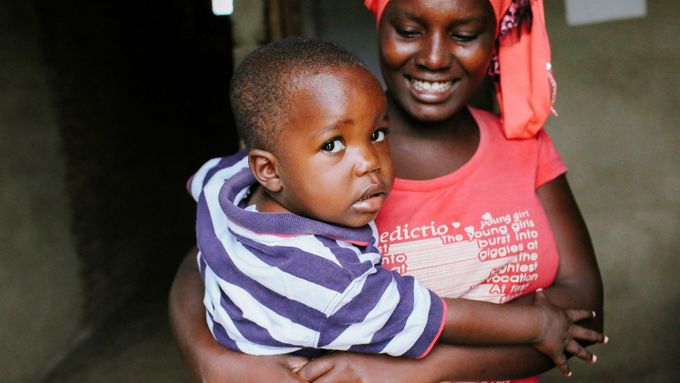Only One Third of Children Receive Appropriate Malaria Care
15.09.2020
Despite lots of progress made in the past decade, more than 270,000 children die from Malaria each year. Most of these deaths could be avoided through timely diagnosis and treatment. Despite better availability of tests and medication, a new study shows that large gaps remain in the quality of malaria care for children. The study by Swiss TPH and partners was published yesterday in the peer-reviewed journal PLOS Medicine.

According to the clinical guidelines, children with malaria should receive a malaria blood test and an appropriate antimalarial drug. (Photo: Danielle Powell/Swiss TPH)
Malaria prevalence has halved since 2000 thanks to tremendous efforts in disease prevention, diagnosis and treatment. However, in recent years, progress has slowed and the World Health Organization (WHO) has called for a renewed focus on malaria (World Malaria Report 2019), including improved and better-enforced guidelines for the clinical management of the disease.
To gain more insights regarding care practices for children with malaria, the Harvard T.H. Chan School of Public Health, the Swiss Tropical and Public Health Institute and the Boston College School of Social Work now published a study analyzing clinical practices in nine sub-Saharan countries.
Major gaps in malaria care in children
According to the clinical guidelines, all children with malaria should receive a malaria blood test as well as an appropriate antimalarial drug. The study published on 14 September 2020 in the peer-reviewed journal PLOS Medicine however shows that this is only the case for about one third of children who presented at a health facility for treatment.
Although 80% of children diagnosed with malaria received some medication targeting malaria, less than 60% of them received a recommended antimalarial. “While we knew that testing is still not done systematically in many areas, we were surprised by the large number of children who do not receive the recommended artemisinin-based combination therapy (ACT) when seeking care at health facilities,” said Günther Fink, senior author of the study and Head of the Household Economics and Health Systems Research Unit at Swiss TPH.
In about 15% of the observed cases, healthcare providers prescribed older and less effective drugs such as quinine. In 10% of cases, artemisinin monotherapies were prescribed, drugs that are not recommended because of resistance concerns. Most remarkably, 20% of children were not prescribed any antimalarial at all despite a malaria diagnosis. While the reasons for not prescribing an antimalarial were not directly collected, options were limited in some settings due to drug stock-outs. In some other cases, no antimalarials were given despite availability of the drug. “This suggests that healthcare workers either did not deem these drugs as essential or assumed that families could not afford them,” said Fink.
Data from 25’000 sick children and 6,400 facilities
The researchers analyzed clinical observation data from nearly 25,000 sick child visits across 6,400 health facilities in nine sub-Saharan African countries (Democratic Republic of the Congo, Ethiopia, Kenya, Malawi, Namibia, Rwanda, Senegal, Tanzania and Uganda) and spanning a 12-year period.
“To our knowledge, this is the only study that has used a uniform clinical observation tool across a range of sub-Saharan African countries to assess the quality of care for malaria,” said Jessica Cohen, Harvard Chan School and first author of the study. “Using data collected from actual clinical observations of pediatric malaria care across a range of settings can provide a crucial window into how effectively children with this very serious disease are being treated in outpatient settings.
Bigger push required to reduce malaria mortality
“The results show that to achieve continued reductions in malaria mortality, we will need to increase our efforts to substantially improve the quality of care,” said Fink. “Such interventions should aim at improving the level of training of healthcare personnel, further enhancing supply chain management, increasing availability of tests and medication as well as improving routine monitoring and supervision of healthcare workers.”
About the study
Cohen J., Leslie H., Saran I., Fink G. (2020). Quality of clinical management of children diagnosed with Malaria: A cross-sectional assessment in 9 sub-Saharan African countries between 2007-2018. PLOS Medicine.
Contact

Günther Fink
Prof. Dr.
Head of Unit
+41612848354
,
**
guenther.fink@swisstph.ch
Stay connected
Subscribe to our newsletter and get all the latest research news, project updates, course and event listings from Swiss TPH.